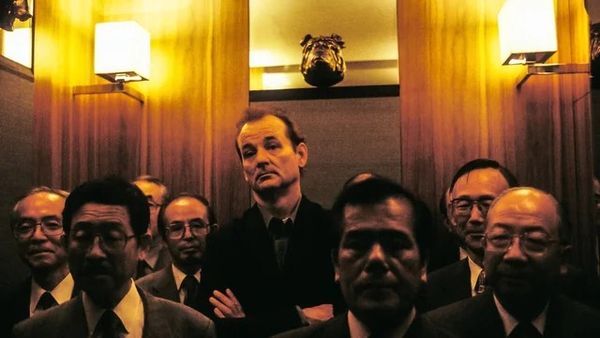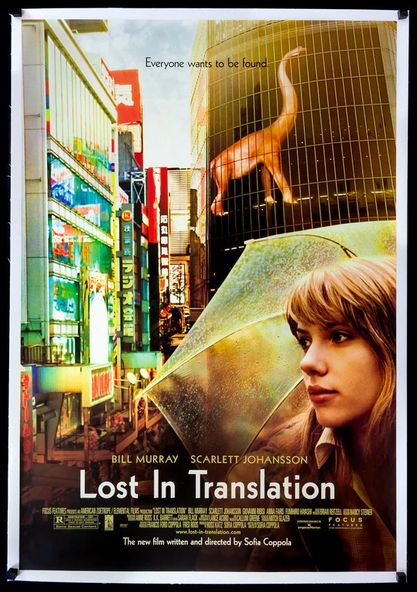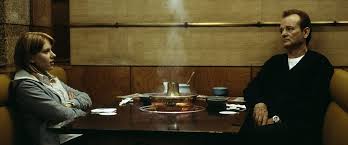Lost in Translation (2003)

Lost in Translation is a beautifully crafted film that explores themes of isolation, connection, and the nuances of human relationships. Released in 2003 and directed by Sofia Coppola, the film stars Bill Murray as Bob Harris, a fading American movie star, and Scarlett Johansson as Charlotte, a young woman grappling with her identity. Set against the vibrant backdrop of Tokyo, the film is a poignant meditation on loneliness and the search for meaning in an unfamiliar world.
The story begins with Bob Harris arriving in Tokyo to shoot a whiskey commercial. Overwhelmed by the bustling city and feeling disconnected from his life, he struggles with his sense of purpose and direction. Simultaneously, Charlotte accompanies her husband, a photographer, on his work trip but finds herself feeling isolated and adrift in a foreign culture. The two protagonists meet by chance in the hotel bar, and an unlikely bond begins to form between them.

One of the film’s strengths lies in its exploration of the characters’ emotional states. Bob and Charlotte are both at crossroads in their lives, seeking solace and understanding in a city that feels alien to them. Their shared sense of alienation fosters a deep connection, leading to moments of intimacy and vulnerability. Bill Murray delivers a nuanced performance, balancing humor and melancholy, while Scarlett Johansson captures the essence of youthful uncertainty. Their chemistry is palpable, making their relationship the emotional core of the film.

Coppola’s direction is characterized by its subtlety and attention to detail. The film employs a dreamy, contemplative style, using long takes and naturalistic dialogue that invite viewers to immerse themselves in the characters’ experiences. The cinematography beautifully captures the sights and sounds of Tokyo, from the neon lights of Shinjuku to the serene temples, creating a rich tapestry that enhances the narrative.

The film’s score, featuring music by Kevin Shields and Phoenix, complements its mood, adding to the dreamlike quality of the story. The soundtrack highlights the emotional landscape of Bob and Charlotte’s journey, reinforcing the themes of longing and connection. The use of music throughout the film amplifies the sense of nostalgia and introspection, drawing the audience deeper into the characters’ inner worlds.

Lost in Translation is also notable for its exploration of cultural dislocation. As Bob and Charlotte navigate the complexities of Japanese customs and language, they embody the feelings of being outsiders in a foreign land. This aspect of the film resonates with anyone who has experienced the challenges of adapting to a new environment, enhancing its relatability. The humor that arises from cultural misunderstandings adds a layer of warmth to the story, balancing the more serious themes of loneliness and existential reflection.
The film culminates in a bittersweet conclusion that leaves a lasting impression. Bob and Charlotte’s time together is fleeting, yet it profoundly impacts both characters, suggesting that meaningful connections can occur even in the most transient circumstances. The ambiguity of the ending invites viewers to reflect on the nature of relationships and the ways in which people can influence each other’s lives, even briefly.
Upon its release, Lost in Translation received critical acclaim, winning an Academy Award for Best Original Screenplay and earning nominations for Best Picture, Best Actor, and Best Director. Its unique blend of humor, poignancy, and visual beauty resonated with audiences, establishing it as a modern classic.
In conclusion, Lost in Translation is a masterful exploration of connection and isolation, wrapped in a visually stunning and emotionally resonant narrative. Through the experiences of Bob and Charlotte, Sofia Coppola crafts a poignant reflection on the human condition, capturing the fleeting moments of intimacy that can arise in unexpected places. With outstanding performances, a captivating score, and a rich portrayal of culture and emotion, the film remains a significant work in contemporary cinema, inviting viewers to contemplate the complexities of love, loneliness, and the search for belonging.











